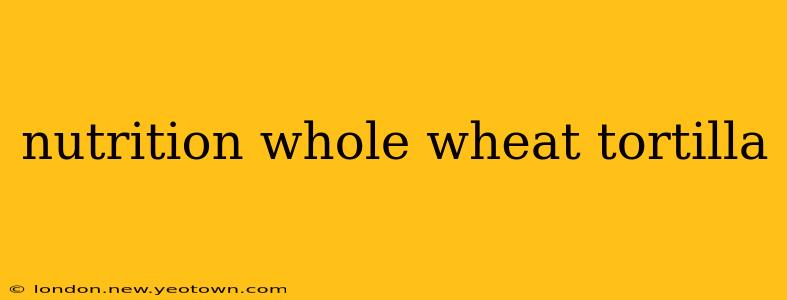The humble whole wheat tortilla. It's a staple in countless kitchens, a versatile base for tacos, burritos, wraps, and even quesadillas. But beyond its culinary convenience lies a nutritional profile often underestimated. Let's unravel the nutritional secrets of this unassuming flatbread and discover why it deserves a prominent place in a healthy diet.
What are the Nutritional Benefits of Whole Wheat Tortillas?
Whole wheat tortillas boast a nutritional advantage over their refined flour counterparts. The key difference lies in the milling process. Whole wheat tortillas are made from whole wheat flour, retaining all three parts of the wheat kernel: the bran, the germ, and the endosperm. This trifecta delivers a potent blend of nutrients, including fiber, vitamins, and minerals, often missing in refined flour tortillas.
Are Whole Wheat Tortillas Healthier Than Flour Tortillas?
Absolutely! The inclusion of the bran and germ in whole wheat tortillas significantly boosts their nutritional value. Refined flour tortillas, on the other hand, have undergone a process that removes much of the fiber and nutrients, leaving primarily carbohydrates. This results in a quicker spike in blood sugar and a less satisfying feeling compared to the sustained energy and satiety offered by whole wheat tortillas.
How Many Calories are in a Whole Wheat Tortilla?
The caloric content of a whole wheat tortilla can vary depending on size and brand. Generally, a 6-inch whole wheat tortilla contains around 70-90 calories. However, it's crucial to check the nutrition label of your specific brand for accurate information. Remember that calories are only part of the picture; the nutritional density is equally important.
What is the Fiber Content of Whole Wheat Tortillas?
Fiber is where whole wheat tortillas truly shine. A single 6-inch tortilla can provide around 2-4 grams of dietary fiber. This fiber contributes to digestive health, promotes regularity, and helps you feel full and satisfied, aiding in weight management. Fiber also plays a crucial role in regulating blood sugar levels, preventing sharp spikes and crashes.
What are the Differences Between Whole Wheat and White Tortillas?
The core difference lies in the type of flour used. Whole wheat tortillas utilize whole wheat flour, retaining all parts of the wheat kernel, leading to increased fiber, vitamins, and minerals. White tortillas, on the other hand, are made from refined white flour, stripped of much of its nutritional value. This results in a less nutrient-dense product with a higher glycemic index.
Are Whole Wheat Tortillas Good for Weight Loss?
Including whole wheat tortillas in a balanced diet can contribute to weight loss efforts. The high fiber content promotes satiety, keeping you feeling full for longer and reducing the likelihood of overeating. Moreover, the sustained energy release prevents energy crashes that often lead to unhealthy snacking. However, portion control remains key, and the overall dietary approach is crucial for successful weight management.
How to Incorporate Whole Wheat Tortillas into Your Diet?
The versatility of whole wheat tortillas opens a world of culinary possibilities. Beyond traditional tacos and burritos, use them creatively! Try them in:
- Breakfast burritos: Load them with eggs, veggies, and cheese for a wholesome start to the day.
- Healthy wraps: Fill them with lean protein, salad, and hummus for a quick and nutritious lunch.
- Pizzas: Use them as a base for a healthier, low-carb pizza alternative.
- Quesadillas: A quick and easy way to enjoy a satisfying and nutritious meal.
The whole wheat tortilla isn't just a convenient food; it's a nutritional powerhouse packed with goodness. By understanding its benefits and integrating it creatively into your meals, you're taking a step towards a healthier and more fulfilling lifestyle. Remember to always check nutrition labels for specific nutrient content as variations exist between brands.

